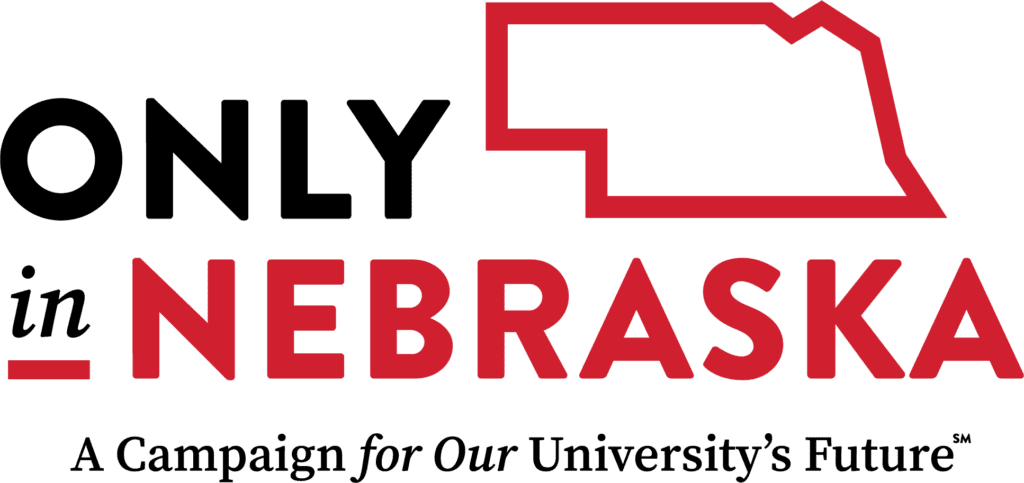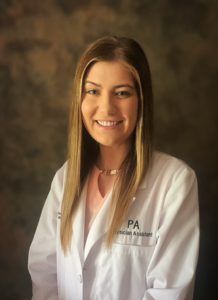Lance Kizer was diagnosed with multiple sclerosis in 2015 at the start of Taylor’s senior year at Overton High School, which is about 25 miles west of Kearney.
On vacation in California with his wife, Lance noticed that his leg began to drag as he tired while walking on the beach. He had experienced other symptoms back home in Nebraska: weakness in his legs and trouble with balance and coordination. Lance went to see an orthopedist and then a neurologist. After undergoing a spinal tap and an MRI, Lance learned his diagnosis.
“None of us was super sure what multiple sclerosis was,” Taylor said, recalling her family’s reaction.
But Taylor knew this: There is no cure.
Taylor set out to learn all she could about the chronic neurological disease while raising funds to benefit the Multiple Sclerosis Research and Education Fund at the University of Nebraska Medical Center.
Taylor and her best friend Sidney Enochs organized a “Take the Shot for MS” basketball tournament at their high school. The “shot” referred to more than just basketball. At the time, Lance was giving himself three injections a week to treat his symptoms. Nine teams signed up, and Taylor and Sidney netted $4,000 in donations.
Taylor and Sidney weren’t done.
After graduating, the two friends enrolled at the University of Nebraska at Kearney. With the help of family, friends, the community of Overton and the surrounding central Nebraska towns, Taylor and Sidney put on three more basketball tournaments and a sand volleyball tournament. They also hosted a 30-mile bike ride between Overton and Kearney. In 2020, when COVID-19 shut down in-person events, Taylor and Sidney sent out donation packets. Their 2022 fundraiser was another sand volleyball tournament, held July 9 in Kearney.
Before the July event, approximately $33,000 had been donated to the UNMC fund through Taylor and Sidney’s fundraising and other donations sent on behalf of the Kizer family.
Rana Zabad, M.D., chief of the multiple sclerosis/neuroimmunology division in UNMC’s Department of Neurological Sciences, said Taylor’s fundraising is critical to advancing the program’s goals.
“Within the last quarter of a century, the science of multiple sclerosis and similar conditions has gone through unprecedented growth in all scientific aspects of the disease, resulting in an earlier diagnosis of MS and similar conditions,” Dr. Zabad said.
The UNMC fund supports training and a fellowship program to prepare the next generation of interested neurologists and psychiatrists to care for people with MS and to conduct research. She said a rise in the prevalence of MS in the United States and worldwide has led to increased demand for neurologists specializing in MS.
And while great strides are being made, treatment and diagnostic gaps exist, including understanding the disease’s “fingerprints” through biomarkers, blood tests or tests of other bodily fluids to allow for earlier diagnosis, managing treatments for long-term safety, reaching MS patients in rural and urban areas, and researching cheaper treatment options.
“With the proven benefit of early treatment and the availability of 23 FDA-approved disease-modifying therapies and counting, there is a pressing need to train more providers with expertise in the accurate diagnosis, earlier treatment and management of treatments’ side effects,” Dr. Zabad said.
MS occurs when the immune system attacks the nerve fibers and the myelin, the protective layer insulating healthy nerve fibers in the brain and spinal cord. Each patient reacts differently, with some having minimal to no symptoms, others mildly to moderately impacted and a third group with significant limitations.
Because of the treatments now available, Dr. Zabad said the disease’s effects can be somewhat mitigated. However, MS still impacts the employment, family and social life of a sizeable group of patients.
Lance, a veterinarian in Overton, is among 4,000 patients being actively followed through UNMC’s multiple sclerosis program.
He says his symptoms have progressed as he expected over the past seven years.
He now uses a walking stick and has lost dexterity in his fingers. “One arm is less useful than it was before,” Lance says.
If he gets a fever, like he did when he had COVID-19 last fall, he can barely walk.
He has cut back his work schedule to part time because of the physical demands of working with large animals.
Lance, 54, attends weekly physical therapy sessions and does balance and stretching exercises at home. Under the care of Dr. Zabad, he comes to Nebraska Medicine in Omaha every six months to receive infusions.
He’s grateful for the care he has received, noting that Dr. Zabad is always willing to spend whatever time it takes to answer questions from him or his wife, Sue.
Sue says her family, which also includes two sons, gets through the tough days with the support of family and friends and their faith.
“You do learn to take it one day at a time. One minute, one hour,” she says. “I wish we knew what the future held.”
Lance and Sue Kizer say they are proud of their daughter’s fundraising efforts but say they’re not surprised. Once she gets an idea, Taylor is determined to see it through.
“This is one way she can help me directly,” Lance says.
Lance’s diagnosis also influenced Taylor’s choice of profession. After earning a degree in health sciences from UNK in 2020, she enrolled in UNMC’s physician assistant program. She expects to graduate in December and hopes to eventually return to the Kearney area to practice medicine.
Tayler says she has been fortunate to meet other families coping with MS through the fundraisers. Donations often are made on behalf of someone with MS. Taylor says she tries to inspire hope because living with a chronic disease like MS can cause people to lose hope.
“We’ve just been able to spread a lot of awareness for multiple sclerosis,” she says.
Dr. Zabad called Taylor a “rising health care advocate.”
“Taylor’s fundraising put Nebraska on the map of MS centers of excellence that offer fellowships,” Dr. Zabad said. “I trust that Taylor will continue to partner with us. She and her family have been of great help to their community raising awareness about the disease and encouraging patients to seek a second opinion and care at UNMC. Taylor’s work enables us to think over and over about our priority — patients first.”
To learn more about the multiple sclerosis program at UNMC, click here.







